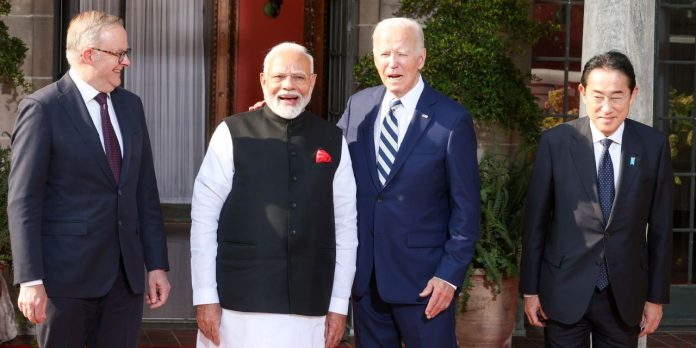By Robert Mizo
The messaging coming out of the September Quad leaders’ summit in Wilmington, Delaware was one of bonhomie and committed engagement among the four Indo-Pacific partners. President Biden, speaking on behalf of the group said, “the Quad is here to stay”, when reporters asked about its future given the imminent leadership change in the US and Japan. In this fourth edition of the Quad leaders’ summit, US President Joseph R. Biden, Jr., Prime Minister Anthony Albanese of Australia, Prime Minister Kishida Fumio of Japan, and Prime Minister Narendra Modi of India reiterated the common goals for which the group was formed – to secure and preserve a rules-based international order, and a free, open, inclusive and prosperous Indo-Pacific. The group further underscored its shared values such as freedom and democracy, and its commitment to mutual respect for sovereignty and territorial integrity and peaceful resolution of all disputes.
This reiteration of the Quad’s intention to stay committed to its goals and collective interest was manifested through a slew of new initiatives and the entrenchment of existing ones. One area where such a development has taken place is in the maritime domain aimed at bolstering maritime security and improving maritime domain awareness, with the ultimate goal of upholding a free and open Indo-Pacific. The Quad had launched the Indo-Pacific Partnership for Maritime Domain Awareness (IPMDA) at the 2022 Quad Leaders’ Summit in Tokyo. This initiative enabled partners to “better monitor their waters; counter illegal, unreported, and unregulated fishing; respond to climate change and natural disasters; and enforce their laws within their waters” through near-real-time, effective radio frequency data. Last week, the Quad leaders announced to introduce another layer of technology by leveraging electro-optical data and advanced analytic software to sharpen the maritime domain awareness picture. This would mean enhanced accuracy in monitoring the maritime region by the partners. Additionally, the Quad introduced a new regional Maritime Initiative for Training in the Indo-Pacific (MAITRI). This training programme will help partner countries to maximize the technology available through IPMDA and other Quad initiatives to “monitor and secure their waters, enforce their laws, and deter unlawful behavior”. India has agreed to host the first ever MAITRI workshop in 2025.
The group also announced the Quad maritime legal dialogue to strengthen existing efforts to uphold the rules-based maritime order in the region. In the interest of deepening regional legal maritime ties, the Quad pledged to engage further and share best practices with regional maritime law enforcement agencies and improve civil maritime cooperation.
In its boldest maritime engagement yet, the group agreed to launch the Quad-at-Sea Ship Observer Mission in 2025. Under this mission, the respective Coast Guards of India, Japan and the US, and the Australian Border Force will undertake a collective exercise on board a US Coast Guard vessel in the Indo-Pacific. This exercise is meant to “to improve interoperability and advance maritime safety”. The Quad official documents are rather circumspect on this mission. While the Quad countries engage in maritime exercises under the Malabar with other partners, this combined Coast Guard operation is a first of its kind of the four partners alone. The earlier reluctance of countries such as India to institute such a mechanism seems to have faded gradually.
With the goal of augmenting the group’s collective logistic capacities, the leaders launched the Quad Indo-Pacific Logistics Network. Under this, the Quad will pursue shared airlift capacity and mobilize collective logistic strengths for a more efficient and rapid deployment of rescue operations in the event of natural disasters across the Indo-Pacific region.
As the Quad pushes for quality maritime infrastructure in the region, the leaders announced the Quad Ports of the Future Partnership. This is geared towards sustainable and resilient port infrastructure development across the Indo-Pacific among the four, and in collaboration with regional partners. Related to infrastructure is the Quad Partnership for Cable Connectivity and Resilience meant to strengthen quality undersea cable networks in the Indo-Pacific. Members of the group have already individually invested in human resources and contributed financially towards this mission through trainings and technology transfers to partners in the Indo-Pacific region. This mission aims to further augment existing efforts to ensure the capacity, durability, and reliability of undersea cable networks which is crucially linked to the regions’ security and prosperity and that of the world.
The Quad’s collective deepening of engagement in the maritime domain continues to be ensconced within the larger goal of a free and open Indo-Pacific and rules-based international order as was seen in the speeches made by the leaders in the summit. The Quad hopes to engage and partner with other like-minded nations in the region towards the realization of these goals.
However, the Quad’s efforts also remain directed towards China and its perceived rise and influence in the region. The groups’ continued China-centricity is evident even as the official documents are careful not to mention the country by name. In fact, India’s prime minister Narendra Modi in his statement said that the Quad was not against any one country. The group however expressed in the joint statement their concerns over the “militarization of disputed features, and coercive and intimidating manoeuvres” in the South China Sea, without naming the country. As though these veiled remarks were not enough, President Biden’s hot mic incident revealed more than what was diplomatically intended. The President was heard saying, “China continues to behave aggressively, testing us all across the region on several fronts, including on economic and technology issues”, and that such an aggressive stance required to be met with “intense diplomacy”.
Though this revelation was not surprising to China or Quad watchers, the Chinese Foreign Ministry spokesperson Lin Jian did respond quickly, accusing the US of “hyping up the “China threat” in order to contain and exclude Beijing, and using the Quad to maintain “U.S. hegemony”. Lin also argued that the “US needs to get rid of its obsession with perpetuating its supremacy and… stop using regional countries as its tool”. Lin Jian’s reaction and response also reveals how China really perceives the Quad as a regional grouping.
Deepening maritime security engagement among the Quad members and with favourable regional partners is in the interest of the group to secure its original goals and aspirations. However, its continued anti-China stance not only antagonises China but does not bode well for the larger interest of the region and the Quad itself. As the Chinese spokesperson Lin Jian said, “forming exclusive groupings undermines the mutual trust and cooperation between regional countries, runs counter to the overwhelming trend of pursuing peace, development, cooperation, and prosperity in the Asia-Pacific and is bound to fail.” Perhaps the Quad should find avenues to engage with China in a constructive manner on issues with which it has more commonalities than differences.
Source:https://toda.org/global-outlook/2024/the-quads-deepening-maritime-cooperation.html






